Race and King of the Hill
King of the Hill was a popular animated sitcom series on Fox which ran from 1997 to 2010, created by former Simpsons writer Greg Daniels along with Mike Judge, the latter also known for comedy films like Idiocracy and Office Space. The show’s portrayal of race was conventional at the time, sometimes unflattering toward Whites, and even pro-immigration, but would be condemned as “racist” by the social justice mob of today. Not only was it not sufficiently flattering to non-Whites, but the series portrays small-town Whites in a relatively sympathetic way which would never be acceptable under contemporary rules of political correctness.
King of the Hill focuses on the Hill family, led by Hank, a proud salesman of propane and propane accessories. He and his wife Peggy, an incompetent substitute Spanish teacher, have a son named Bobby and have informally adopted their niece Luanne, both being generally good-natured but neither very bright.
Indeed, the ignorance and incompetence of many of the characters is a frequent subject of humor. Hank’s friend Bill, a dimwitted and divorced army barber, often beclowns himself. At one point he attempts to commit suicide, but is unsuccessful as he slams his head in a drawer, puts his head inside an electric stove, tries to drown himself in the toilet, and falls off the roof of a one-story building from which he meant to jump. He is even incompetent at stepping in front of traffic. Hank is more intelligent and less clownish than Bill, but still sometimes shows his naivete, such as when he unwittingly buys crack cocaine to use as fishing bait.
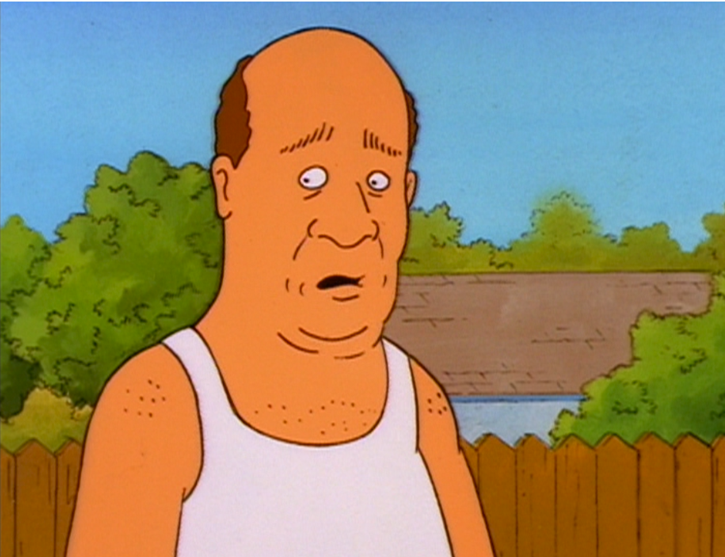
Bill is confused and saddened by Hank’s humor at his expense.
The show does not express the outright malice towards Whites which is becoming the norm today, but unfortunately is implicitly anti-White in some ways. The clearest such theme in the show involves Dale Gribble — a paranoid exterminator and one of Hank’s best friends — and his unfaithful wife. Nancy, a blonde White woman, has been having frequent sexual encounters for many years with John Redcorn, a Native American healer. In contrast with Dale, who is comically out of shape and cowardly, Redcorn is very muscular and stoic. At one point, Nancy is disgusted and ashamed by the fact that she has slept with Dale, rather than by her extramarital affair. A running joke in the series is that Dale, while often expressing paranoia about government conspiracies, never suspects the relationship between his wife and Redcorn. This is despite repeated hints, such as his “son” Joseph having strangely dark skin.
A White male character is thus portrayed as not only an undesirable mate but also a cuck at the hands of a non-White man, and too foolish to even be aware of it. Although no one explicitly makes an issue of Dale’s race, there is a general emasculation of White men in the series. None of the White male characters are as masculine as Redcorn, either physically or psychologically. Even Hank, though more authoritative than Dale, is emasculated; he is out of shape, horrified by any reference to sexuality, and had trouble conceiving due to his narrow urethra. At one point he even finds he has a low sperm count.
Outside of his adulterous relationship with Nancy, John Redcorn is portrayed as noble and wise. However, this is done in a way which would trigger censors to flag it as “racist stereotyping” today. He is always wearing Native American jewelry, and often when he speaks of his people’s traditions, it suddenly becomes windy so that his long hair is accentuated, while tribal music plays in the background.
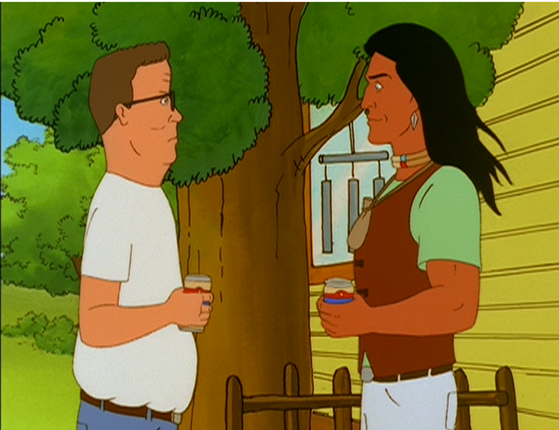
John Redcorn is unmoved by Hank’s threat to “kick your ass” if he touches his wife inappropriately.
The other consistent racial theme in the series is the relationship between the Hills and their Southeast Asian immigrant neighbors. Kahn and Minh Souphanousinphone are from Laos, which as Kahn explains to Hank and friends’ bewilderment is neither China nor Japan, but a landlocked country between Thailand and Vietnam. Kahn often derides Hank and his family as “rednecks” or “hillbillies,” which is likely meant as a racial slur; he calls Hank “cracker” as well. The Hills, of course, being White and having conventional attitudes toward race, never attack the Souphanousinphones’ ancestry, but only express ignorance of their culture. Peggy at one point claims that according to their Buddhist faith, it does not much matter if their daughter dies because she will be reincarnated as “a grasshopper or a seahorse.”
The more conservative Hank does not like the boastful and manipulative Kahn, however, and at one point wishes he had never been let into the country. In one episode when the Hills are on a road trip to Mexico and they come to the fence at the border, Bobby asks if the Souphanousinphones came through the fence, and Hank responds that “Kahn applied the legal way; sometimes the system fails us.”
In the same episode, partly through Dale’s paranoia and incompetence, Hank is put in the position of sneaking back into the United States illegally. His White friend Dale abandons him after Hank helps him over the fence, but his Asian neighbor Kahn saves him by giving him his hand just as the border patrol is approaching, and the “camera” focuses on their clasped White and brown hands to emphasize their interracial cooperation. Kahn later taunts Hank, calling him the real immigrant and boasting of his own knowledge of the history of “my country,” meaning the US. The sequence seems to be designed not only to Americanize immigrants but even to romanticize illegal immigration.
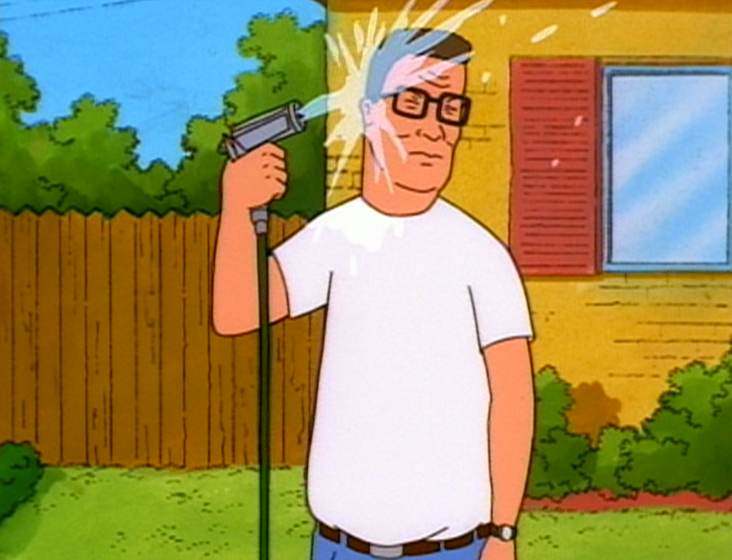
Hank demonstrates a non-confrontational White response to his Asian neighbor’s obnoxious singing.
The Asian neighbors have named their daughter Kahn Jr., but she calls herself Connie. This and other facts point to her desire to assimilate into American culture. She briefly dates Bobby Hill, despite her parents’ desire that she date a particular high-status Asian boy.
Current-year pieties would suggest that Whites are particularly narcissistic and greedy, while other races are more noble. But the Souphanousinphones are more materialistic and status-seeking than the Hills, despite being nominally Buddhist. Along with both parents’ obsession with fitting in with other high-status Asians, Kahn boasts about how much money he makes and the luxuries he can afford. The more Westernized Connie, who born in the United States, is disgusted by this mindset.
The Laotian family would be considered an offensive caricature by producers today, and not only because of their unpleasant personality traits. Like Apu Nahasapeemapetilon in the Simpsons, who was recently cancelled for being a “racist” stereotype, the Souphanousinphones have an absurdly long surname. Kahn and Minh also have comically strong accents, despite living in the United States for at least 20 years according to Kahn. But one of the most interesting displays of their racial difference comes at the funeral of Buckley, Luanne’s boyfriend who died in an accidental explosion.
Few people are willing to speak about Buckley, as he was an unremarkable character. But Kahn decides to draw attention to himself by giving a speech in which he clownishly pretends to be very moved by Buckley’s death. In an even stronger accent than usual, he tells a Buddhist fable, which in contrast to the show’s usual animation is illustrated in the style of traditional East Asian paintings. The narrative follows a man being chased by a “ferocious tigah.” The man falls over a cliff, stops his fall by catching a protruding branch on the cliff face, but then sees a similar monster on the ground below. Knowing he is trapped and about to die, he reaches for a strawberry growing from the branch and finds it is “the most delicious strawberry he ever had.” This scene is cartoonishly exotic, like the caricatures of Asians in South Park. It would surely be considered “otherizing” and offensive stereotyping today.
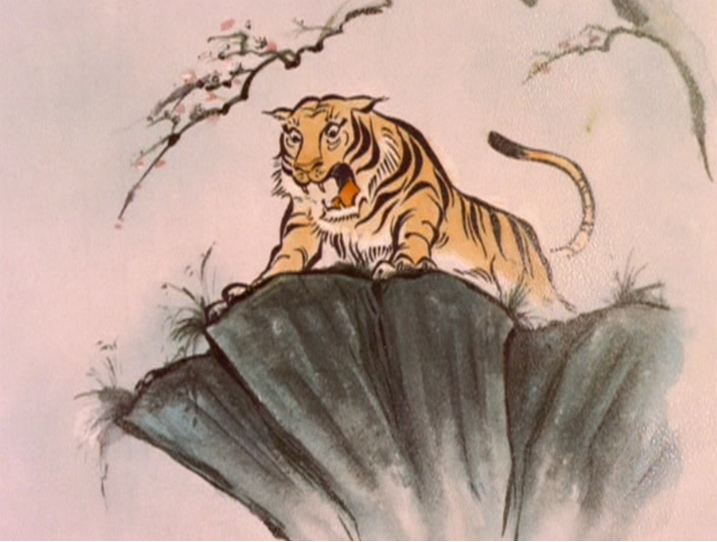
A tiger menaces an Asian man in Kahn’s telling of a Buddhist parable.
Further emphasizing how unfamiliar the mindset of a supposedly assimilated immigrant is to native-born Americans, none of the Whites in the audience understand this parable about appreciating the small things in life, even in the presence of death. Hank initially misinterprets it as a joke and considers it inappropriate. He later repeats an Americanized version of it to Bobby, with Detroit Lions in place of tigers and Gatorade in place of the strawberry, but the younger Hill has a similar problem understanding the Asian wisdom, saying, “I get it — it’s funny.”
Bobby expresses what was then the standard attitude among Whites toward Asian culture; he is neither “xenophobic” nor a self-hating White who would distance himself from his own nation to identify with another. In one episode he becomes enamored with Taoism and quotes Lao Tzu, even getting Hank to accept the concept of wabi sabi, meaning the beauty of minor imperfections. In another episode, though, he affirms his attachment to a traditional American lifestyle. A group of Tibetan monks come to town, suspecting that Bobby is the reincarnation of their deceased master, Lama Sangluk. Their final test to confirm his status and grant him a new life as a monk is to show him a set of items and let him identify the one that belonged to Sangluk. Knowing that the monastic lifestyle does not allow girlfriends, he points to Connie’s reflection in a mirror, telling the Tibetans that he chooses her. Although the mirror belonged to Sangluk, the head monk interprets this as a choice for romance instead of a monk’s life, and Bobby continues as a regular White American rather than assimilating into Asian Buddhist culture.
On the other hand, Bobby expresses the common infatuation of White American youth with Black culture and has to be reminded of who he is. In one episode, Hank catches Bobby walking down the middle of the street, blocking traffic while listening to rap music. Bobby explains that the artist is Pimp Franklin and that “he don’t need your respect, ’cause he don’t pay no man no mind.” Hank angrily rejects this cultural enrichment and takes Bobby to the record store to find more race-appropriate music.
In another episode he becomes a fan of a crude Black comedian named Booda Sack, who often mocks White people. As an aspiring comedian himself, Bobby tries to emulate him and proposes joking about how the police are always pulling him over. Mr. Sack has to explain to him that “you’re not Black,” and invites him to perform at a local comedy club as soon as he can make jokes more in line with his own perspective as a White male. This leads him to make “offensive” racial jokes based on material he finds on a White nationalist website. The audience boos him, but Mr. Sack, rather than calling for him to be blacklisted or for his father to be fired as would be customary today, defends his right to free speech as an American tradition.
Thankfully, although Mr. Sack is ultimately depicted as a loyal American, the episode does not romanticize Black culture or imply that he is just like a middle-class White man under the skin. He is depicted as exceptionally loud and obnoxious, and his humor is simply lowbrow personal insults. He even practices his comedy at work, where he is expected to be acting as a driving instructor, and gets fired for offending too many clients. He had previously experienced a downturn in his comedy career for similarly offending people with his performance on a Black sitcom. His dark-skinned audience at the comedy club is not depicted as particularly civilized either. They are clearly baffled when he defends the tradition of freedom of speech, even though he explains it using appropriately colorful terminology.
In one episode, King of the Hill actually mocks the hysteria around “racism.” Hank’s dog Ladybird attacks a Black repairman named Mack who has come to fix the water heater, and the man accuses the dog of being racist. Hank invites Mack to stay for lunch to show that neither he nor the dog are racist, but Ladybird attacks him again. He takes Ladybird to a dog trainer and nervously explains her apparent prejudice, but the contemptuous trainer, who boasts that he has a Black girlfriend, explains that it is impossible for a dog to have such feelings; she must instead be responding to cues from a racist owner. The other people in the room glare at Hank disapprovingly, and after he fails a questionable online racism test, the local church congregation soon joins in scorning Hank as “racist,” even praying on his lawn for his soul.
Ultimately a White repairman comes to his house, and Ladybird attacks him as well. Hank realizes that the dog does not hate Blacks, but only repairmen, as he himself does. The episode ends with him laughing joyfully at the realization that he is not racist, unconcerned by the dog’s ongoing violence toward the repairman. Whether intentional or not, this is a fitting mockery of how the popular obsession with appearing “non-racist” takes precedence over addressing real-world problems such as violence.
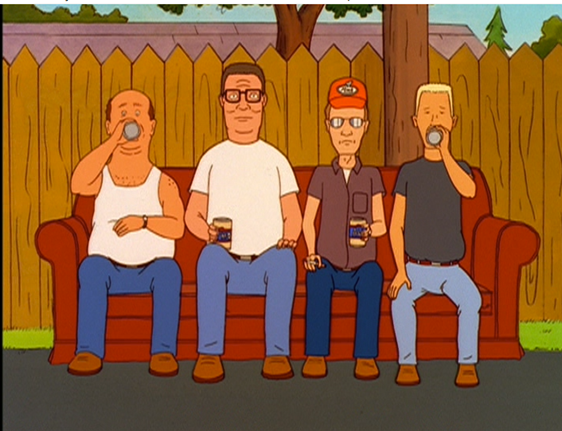
Hank Hill and his neighbors Bill, Dale and Boomhauer drink beer by the side of the road.
Despite every White character being laughable to some degree, King of the Hill implies too much sympathy for the wrong people to fit with current-year social justice sensibilities. Even the lowest elements of White society are portrayed sympathetically. Luanne Platter, Hank and Peggy’s niece, is the product of the teen pregnancy of a violent and manipulative alcoholic named Leanne, and previously lived in a trailer. But Luanne herself is more wholesome than her mother, despite being dimwitted. She never displays any criminal tendencies beyond minor mischief, never abuses the Hills, and takes great pride in putting on a Christian puppet show.
The Hills are often shown to have wholesome family relationships, as when Bobby says to Hank at the end of one episode, “this is the best birthday ever, and you’re the best dad ever!” They also display an admirable ability to take joy in small things; when Bobby sees a new dryer which he misinterprets as his birthday present, he is so pleased that he literally embraces it.
The main characters in King of the Hill are ordinary gun-owning Whites in a red state who express vaguely conservative attitudes such as a general suspicion of government. As such, if they had existed in 2016, they might have voted for Trump. But they are never portrayed as the monsters such people would be in present-day entertainment media. We can only hope that during our lifetimes, anti-White trends in the mass media and wider culture will be reversed and it will again become normal to portray such people in a sympathetic light.





Let’s look at American “popular culture” and see how the white heterosexual American male is portrayed and treated. Today’s popular culture and the culture going back forty years or so has portrayed white males as bumbling idiots, controlled and insulted by, a know-it-all domineering “wife”, with snotty and bratty children insulting him at every turn.
Us adult white heterosexual males are not looked upon as leaders and protectors of society and their families as we once were, but are relegated to the lowest level of humanity, to be used and abused by everyone else.
It doesn’t stop there, Hollywood’s negative portrayal of white males, with minorities being in positions of power and responsibility, the (inferior) white male is always answering to a minority superior, supervisor or leader, despite reality dictating otherwise.
The “education system” is no better, being geared for females, who have totally feminized the system, relegating boys to the status of being dysfunctional, to be drugged and even ostracized, just for being boys.
The condemnation of us white males is almost complete. It is long overdue to take back our rightful place in society. Start out by boycotting jew-run Hollywood and letting program sponsors know why…
It starts with recognizing “who owns and runs hollywood”. Hint: It ain’t white heterosexual males…
“Not only was it not sufficiently flattering to non-Whites, but the series portrays small-town Whites in a relatively sympathetic way which would never be acceptable under contemporary rules of political correctness.” Good observation. I have noticed after many years of viewing, many Hollywood films portray small towns a wicked and backward, among them, “To Kill a Mockingbird.”
I wonder if Whites have the strength to retain their majority in this country and to prevent a disastrous takeover by non-White minorities and possibly genocide.
It all reminds me of the prescient French novel Camp of the Saints where illegal immigrants land in Europe by the millions, and the Whites are too weak to resist.
In America today we see mobs of non-Whites and deracinated young Whites tearing down statues of White people while the good Whites mostly sit at home watching it all on TV and letting it happen.
I see armed Black militia and wonder where America will end up:
https://www.theroot.com/armed-black-militia-marches-through-stone-mountain-park-1844284200
Note: Mike Judge is known primarily for Beavis and Butthead, the animation style of which King of the Hill followed.
Keep in mind that Greg Daniels, one of the show’s creators, is Jewish.
Another bastion of American civilization is going by the wayside. Tampa Bay is sliding down to Third World anti-EuroMan kultura. Today, on the Tube, it was noted that in a most popular tourist haven, St. Petersburg, the uncivil are again blocking traffic.
Further, it was announced that police will no longer go to calls that are not related to violence. As in other US regions, no cops will be at in the scene of a robbery or other nefarious behavior. Instead a social worker will be sent.
A large percentage of the anti-majority are self-loathing millenniums with little life experience. It’s almost like an insane asylum.
Having been around Mother Earth one is astounded by the ignorance. It is an absolute fact that blacks from around the old seek to enter White civilization such as America, Australia, Canada, Europe, New Zealand. They don’t wish to become past of any black civilization. In fact, the SA population of Boars has plummeted as masses of Whites have left South Africa (formerly a First World country).
The loathing directed against police, who serve the public, is obviously a product created by indoctrination from monopoly TV and schools. Many millenniums, having AfroAm friends have bought into the ignorant indoctrination oscillating around so called oppression being the variables for black failures. The film industry has fueled the flames of hate. Watch the upcoming Amazon film of Billionaire Jeff Bezos. It’s full of violence against Ws by Bs.
Will Western Civilization remain First World? Will the USA break up at first from unofficial City states (like now)? Will Washington, D.C. be made into a state? Will other states follow that path? Then, will there be unofficial regional separations, that eventually become de facto nations?
Past Washington “representatives” have done everything to alter US demographics. Because of the perhaps 40 mln population of illegals voting, the USA has to change. Think of the ballot box. Just look at Minneapolis where the population is now perhaps about 20% Somali. Look at NYC, Philly, Bulletmore, Chicago… Demographics have altered mentality. That’s not a hateful politically incorrect wrong thought. It’s a truth.
Each and every day millenniums are joining blacks and burning the American flag. Rioters are yelling anti-American slogans, tearing down anything that represents the USA . Demonstrations are everywhere. People are being assaulted. Police officers are fearful of having the label of racism.
Will the United States morph into a second South Africa? Will the majority fight back? Certainly if the next generation hates America -as is being seen all over- the USA will disappear.
I watched the show, never religiously, over many years. I think this article gets it exactly right. While the show peddles some of the usual put-downs of Southern whites, it nevertheless is mild in that it never condemns people like the Hills. The Kahns, members of a parasite tribe, are presented as crassly self-promotional, the mother, a typical Tiger Mom. Mike Judge is a very bright guy, a rocket scientist, in fact. He has a gift for satire, as shown not only in King of the Hill but also Beavis and Butthead–a brilliant dissection of gen-ex anomie–and the film, Office Space, which deserves an article from a WN perspective. Here we have an exploration of the “any tech” work place in its full vulgarity. It, too, creates white villains, heroes and hapless working class members, and portrays blacks and Muslims in a favorable, but not white-washed, light. But it offers a memorable critique of the American workplace. As well, it explores characters’ mute rage that turns to sabotage, and the prospects of living a satisfying life in today’s (at the time) economy.
On the Laotian familys aggressive social climbing, in one episode the Khans want to get their daughter into Rice University. Rice rejects her the first time.
Then Khan decides to turn white trash. He falls in with a crowd that eats squirrel tacos and stages fake accidents to collect pain and suffering settlements.
In his last escapde he is arrested. That gives his daughter a rising up from poverty story to pitch to the admissions officers at Rice and she finally gets in.
THAT’s the way the FILTHY poisoners work. “Drink up–it’s good for you; it’s fun!” Kids ingest it and are poisoned
Have no doubt. Self-alienation is sickness, often a result of poisoners.
Insidious tapeworms, working within.